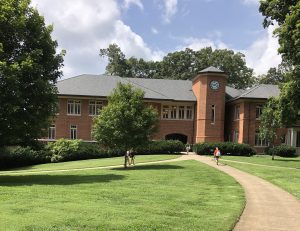GREENEVILLE – An $843,942 Tennessee Community CARES grant will empower Tusculum University to make significant technological advancements to meet the increasing need for virtual learning during the global coronavirus pandemic.

Thomas J. Garland Library
Tusculum earned the funds through a competitive grant process that enabled the university to detail how it would be able to enhance its academic resources for students to lessen the short- and long-term impact of the coronavirus on its learning environment. The grant will address many needs Tusculum has experienced with the return of students, particularly Wi-Fi upgrades and fiber optic network costs.
“The investment by the state and federal governments will ensure our students continue to have an outstanding learning experience at an unprecedented time in academia,” said Dr. Scott Hummel, Tusculum’s president. “We are grateful for this grant and thank the state and federal governments for being aware how the coronavirus has changed the education landscape. These funds will provide agility in the way our faculty teach and our students learn.”
When the coronavirus reached East Tennessee in the spring, Tusculum converted solely to an online instruction method that continued into the summer. With the start of the 2020-21 academic year in August, Tusculum returned to face-to-face instruction. This teaching method is particularly important for first-generation college students – whose parents did not receive a bachelor’s degree. Those students tend to have greater success with an in-person learning component than with strictly online coursework.
As part of in-person instruction, Tusculum has made some modifications that necessitated technological enhancements. To maintain proper physical distancing in classrooms, large classes were divided into two groups, with alternate days between attendance in person and participating via Zoom or through online coursework. This has demonstrated Tusculum’s ability to easily transition from one teaching mode to another as needs warrant.
In addition, all faculty office hours are now conducted virtually, and advising services are provided via phone or Zoom.
If the coronavirus situation becomes more serious, Tusculum might have to temporarily pause face-to-face instruction and move to other formats. That will require Tusculum to have the necessary technology in place to accommodate those changes and to maintain learning at a high level.
“Our faculty members and students adjusted to the online environment in the spring and summer, but the value of an on-campus residential and face-to-face classroom experience is vitally important for so many of our students,” said Dr. Tricia Hunsader, Tusculum’s provost and vice president of academic affairs. “All of the changes the coronavirus has brought require us to have a robust technology system, and the assistance from the state and federal governments will give us the tools to accomplish that.”
In addition to technology, the grant will provide financial support for sanitation supplies, protective equipment and other miscellaneous expenses, such as masks, gloves, goggles and forehead thermometers.
The funds came from the Tennessee Community CARES Program funded by the federal CARES Act. Gov. Bill Lee, the Tennessee Department of Human Services and the Financial Stimulus Accountability Group created the program to invest $150 million in coronavirus relief funds. Dr. Hummel said obtaining the grant was a team effort involving multiple departments through a process led by Lisa Shiveler, Tusculum’s grant writer.
This grant is in addition to earlier funds the university received from the CARES Act to assist students with needs they were experiencing and provide room and board refunds in the spring. In addition, the university received funds through the Paycheck Protection Program.
“The pandemic has presented many challenges, but our dedicated faculty and staff are collaborating to successfully navigate this period,” Dr. Hummel said. “Their task has been made easier with critical support the federal and state governments have provided. They have demonstrated tremendous insight that will have a long-term positive impact on our students.”
For more information about the university, please visit www.tusculum.edu.


